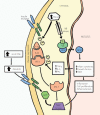Obesity and Stroke: Does the Paradox Apply for Stroke?
- PMID: 33389919
- PMCID: PMC7946563
- DOI: 10.5469/neuroint.2020.00108
Obesity and Stroke: Does the Paradox Apply for Stroke?
Abstract
Historically, obesity has been identified as one of the most important risk factors for developing cardiovascular diseases including stroke; however, a theory called "The Obesity Paradox" has been recently considered. The paradoxical theory is that obese or overweight patients (according to body mass index score) can have better outcomes compared to leaner or malnourished patients. The paradox was initially discovered in patients with heart failure. The purpose of this manuscript was to investigate whether this paradox also applies to stroke patients, according to information available in the current literature.
Keywords: Body mass index; Cerebrovascular disease; Obesity; Stroke.
Conflict of interest statement
The authors have no conflicts to disclose.
Figures


Similar articles
-
Obesity Paradox in the Course of Cerebrovascular Diseases.Adv Clin Exp Med. 2015 May-Jun;24(3):379-83. doi: 10.17219/acem/22287. Adv Clin Exp Med. 2015. PMID: 26467124
-
Body mass index and death by stroke: no obesity paradox.JAMA Neurol. 2014 Aug;71(8):978-84. doi: 10.1001/jamaneurol.2014.1017. JAMA Neurol. 2014. PMID: 24886975
-
Obesity paradox and stroke outcomes according to stroke subtype: a propensity score-matched analysis.Int J Obes (Lond). 2023 Aug;47(8):669-676. doi: 10.1038/s41366-023-01318-0. Epub 2023 May 3. Int J Obes (Lond). 2023. PMID: 37137958 Review.
-
Obesity paradox and stroke: a narrative review.Eat Weight Disord. 2021 Mar;26(2):417-423. doi: 10.1007/s40519-020-00876-w. Epub 2020 Mar 2. Eat Weight Disord. 2021. PMID: 32124408 Review.
-
The obesity paradox in patients with acute coronary syndromes over 2 decades - the ACSIS registry 2000-2018.Int J Cardiol. 2023 Jun 1;380:48-55. doi: 10.1016/j.ijcard.2023.03.038. Epub 2023 Mar 20. Int J Cardiol. 2023. PMID: 36940822
Cited by
-
Effect of metabolic disorders on reactive gliosis and glial scarring at the early subacute phase of stroke in a mouse model of diabetes and obesity.IBRO Neurosci Rep. 2024 Dec 4;18:16-30. doi: 10.1016/j.ibneur.2024.12.002. eCollection 2025 Jun. IBRO Neurosci Rep. 2024. PMID: 39816479 Free PMC article.
-
Impact of non-alcoholic fatty liver disease and liver fibrosis on outcomes of acute ischemic stroke: A systematic review and meta-analysis.Pak J Med Sci. 2025 Feb;41(2):630-636. doi: 10.12669/pjms.41.2.10729. Pak J Med Sci. 2025. PMID: 39926662 Free PMC article. Review.
-
Identifying obesogenic environment through spatial clustering of body mass index among adults.Int J Health Geogr. 2024 Jun 26;23(1):16. doi: 10.1186/s12942-024-00376-5. Int J Health Geogr. 2024. PMID: 38926856 Free PMC article.
-
Stroke: Molecular mechanisms and therapies: Update on recent developments.Neurochem Int. 2023 Jan;162:105458. doi: 10.1016/j.neuint.2022.105458. Epub 2022 Nov 30. Neurochem Int. 2023. PMID: 36460240 Free PMC article. Review.
-
Direct Oral Anticoagulants in Patients with Obesity and Atrial Fibrillation: Position Paper of Italian National Association of Hospital Cardiologists (ANMCO).J Clin Med. 2021 Sep 16;10(18):4185. doi: 10.3390/jcm10184185. J Clin Med. 2021. PMID: 34575306 Free PMC article. Review.
References
-
- Hubert HB, Feinleib M, McNamara PM, Castelli WP. Obesity as an independent risk factor for cardiovascular disease: a 26-year follow-up of participants in the Framingham heart study. Circulation. 1983;67:968–977. - PubMed
-
- Wu S, Wu B, Liu M, Chen Z, Wang W, Anderson CS, et al. China Stroke Study Collaboration. Stroke in China: advances and challenges in epidemiology, prevention, and management. Lancet Neurol. 2019;18:394–405. - PubMed
-
- World Health Organization (WHO) Geneva: WHO; Obesity and overweight [Internet] [cited 2020 Oct 28]. Available from: https://www.who.int/news-room/fact-sheets/detail/obesity-and-overweight.
-
- Finkelstein EA, Trogdon JG, Cohen JW, Dietz W. Annual medical spending attributable to obesity: payer-and service-specific estimates. Health Aff (Millwood) 2009;28:w822–w831. - PubMed
Publication types
LinkOut - more resources
Full Text Sources
Other Literature Sources

